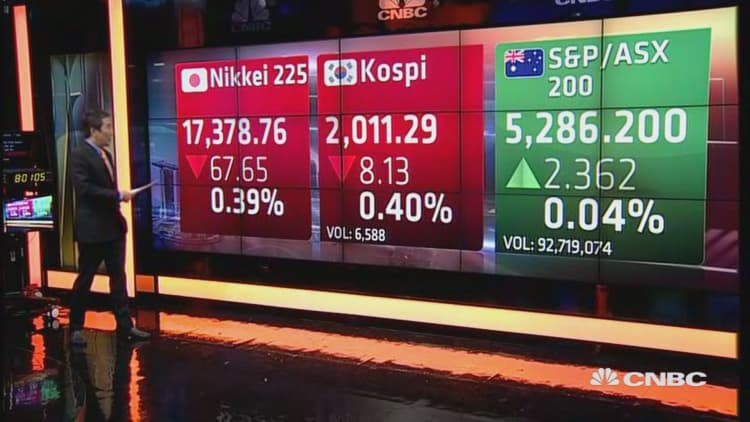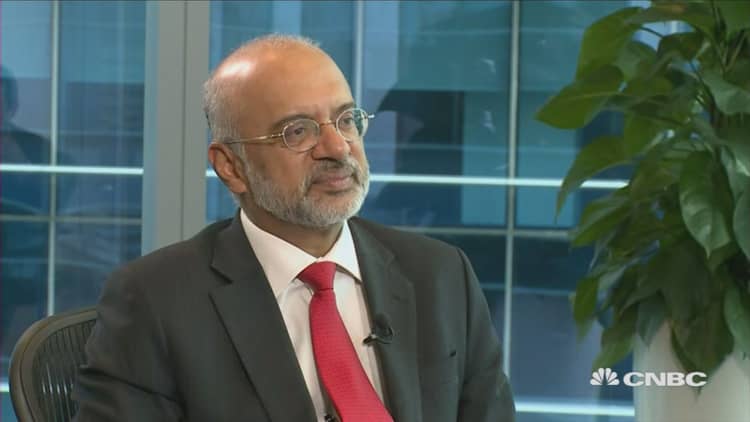Asian markets were mostly lower, as a triple-whammy of concerns over the upcoming U.S. presidential election, weak Japanese data and lower oil prices weighed on sentiment.
News broke on Friday that the Federal Bureau of Investigation (FBI) found new Hillary Clinton-related emails during a probe of devices used by former Congressman Anthony Weiner and his estranged wife, Clinton aide Huma Abedin.
On Sunday, the FBI obtained a warrant to search the emails in relation to its investigation of the Democratic nominee's use of a private server for official emails while she served as secretary of state.

Market pros told CNBC on Friday that the prospect White House rival Donald Trump - who has been trailing Clinton in polls - could win the election, or that a President Clinton would have a long-running FBI investigation hanging over her, unsettled Wall Street.
The finished down 8.49 points at 18,161.19, wiping out gains of about 75 points higher before the new email probe was announced. The index traded 74.71 points lower following the announcement.The S&P 500 closed 0.31 percent lower and the composite finished down 0.5 percent.
Down Under, the ASX 200 was among the few Asia Pacific markets in positive territory on Monday, finishing up 0.64 percent or 33.894 points, at 5,317.732, boosted by a 0.9 percent gain in its materials subindex, and the industrial subindex, which gained 1.59 percent.
"The ASX was initially under pressure in the morning, but the tide turned after the PBOC strengthened its currency in its daily yuan midpoint fix," Weston explained. The People's Bank of China set its Monday yuan midpoint fix lower at 6.764, versus its last close at 6.7810.
"It was a refresher to some people that we're not going to see a sustained devaluation of the Chinese yuan, which benefits Australia's mining sectors and industrial space," he added.
Japan's closed down 0.12 percent or 21.39 points at 17,425.02, as investors awaited announcements from the Bank of Japan, which started a two-day monetary policy meeting on Monday.
But most analysts don't expect any surprise moves from the central bank.
"The focus of the discussion at the meeting is likely to be the effectiveness of the new policy tool and its implementation strategy. Fortunately, the ongoing depreciation of the yen will allow the BOJ to stay on hold next Tuesday," said Kohei Iwahara, economist at Natixis Japan Securities, in a Friday note.
Mainland Chinese markets were moderately lower. The finished down 0.09 percent or 2.895 points at 3,101.375, while the Shenzhen composite ended down 0.08 percent, or 1.739 points, at 2,050.276.
Hong Kong's was up 0.13 percent mid-afternoon, after initially slipping more than 0.6 percent; South Korea's Kospi ended down 0.56 percent, or 11.23 points, at 2,008.19.

In currency markets, the yen weakened against the dollar, fetching 104.84 as of 2:52 pm HK/SIN, but still below the key level of 105 seen during Friday's Asian session.
The dollar index, which measures the greenback against a basket of six major currencies, traded at 98.477 around 2:52 p.m. on Monday, after last week moving to levels as high as 98.8.
The was trading at 18.9417 against the dollar as of 12:52 p.m. HK/SIN. On Friday the peso plunged more than 1 percent against the dollar in a knee-jerk reaction to news of FBI's relaunched investigation into Clinton-linked emails.

On the corporate news front, Singapore's DBS Group said it would buy ANZ's retail and wealth operations in Singapore, Hong Kong, China, Taiwan and Indonesia for about $110 million ($80 million).
"This transaction simplifies our business while allowing us to continue to benefit from high levels of growth in the region through a focus on our ... large corporate and institutional clients driven by trade and capital flows particularly in Australia and New Zealand," said ANZ Chief Executive Officer Shayne Elliot, in an official statement.
ANZ investors appear to have viewed the deal favorably, with the stock up 0.83 percent at A$27.85 ($21.18). But DBS Group share dipped 0.07 percent to S$14.91 ($10.72), likely capped by the Singapore lender reporting a flat net profit and interest income in the third-quarter.
Three Japanese shippers announced a joint venture to merge their container shipping operations, sending the stocks in all three gyrating. Shares in Nippon Yusen were up 6.44 percent, while Kawasaki Kisen Kaisha trimmed its gains to 0.39 percent. Mitsui OSK Lines surged 5.62 percent.
The global shipping industry has in recent years struggled with sluggish global demand and overcapacity. The three firms said the merger would see annual cost benefits of about 110 billion yen ($1.05 billion), Reuters reported.
"While [the three Japanese carriers] do cooperate on many services, what they lack individually is scale, a crucial requirement when competing on the main east-west trades (the Asia-Europe/transpacific route) with the big carriers such as Maersk, MSC and CMA CGM," said Greg Knowler, maritime and trade expert at IHS Markit, in a Monday note.
"The merger of their container businesses will provide the scale in vessel capacity the new Japanese joint venture needs to participate on all services operated by the alliance," he added.
In South Korea, the embattled container shipping company Hanjin Shipping traded up 24.75 percent on news of Seoul's plan to establish a state-backed ship financing company to support the hard-hit industry.

Data released Monday in Japan showed continued weakness. The Ministry of Economy, Trade and Industry reported that September industrial output was flat from the previous month amid sluggish global growth, and September retail sales fell for the seventh straight month, down 1.9 percent year-on-year.
But there were some bright spots; September auto production increased 1.4 percent from a year ago, and September housing starts increased 10 percent on-year, beating expectations.
Meanwhile, the oil market focused on the lack of concrete commitments by both Organization of Petroleum Exporting Countries (OPEC) and non-OPEC members on a planned production cut from their Friday and Saturday meetings.
Brent futures continued its declines from Friday's session, trading down 0.42 percent to $49.50 a barrel on Monday. U.S. crude futures were down 0.47 percent at $48.47 after last settling at $48.70.
"With 'The Donald' making a late surge in the polls and creating a generally risk-off tone in the markets, combined with OPEC's inability to even agree what should be for lunch, we expect crude to remain under pressure during the start of the week," Jeffrey Halley, senior market analyst at Oanda, said in a Monday note.
India and Philippines markets are closed for public holidays.

